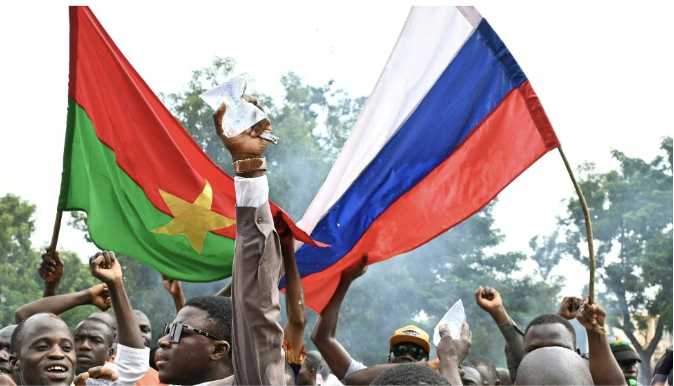Russia spreading propaganda through West African unrest
By Oliver Straight Nissen ’25
2020 marked the start of another series of coups in West Africa. Mali endured a military coup as a result of poor national security, and over the past three years, many other countries in West Africa have also experienced internal unrest. These recent uprisings in West Africa have led to both domestic and international instability, as Russia has capitalized on the opportunity to spread propaganda throughout the region.Russia’s expansion of influence has further hurt its foreign relations with Western countries, which have already been hostile as a result of Russia’s invasion of Ukraine.
It is important to understand why these coups have occurred in order to understand how Russia has asserted itself in West Africa. The 2020 Malian coup began because of the ongoing insurgency led by rebel factions, which sparked anti-government protests demanding Malian President Keïta to resign. These factions, which are mostly Islamic terrorist groups, including Al Qaeda and ISIS, have long threatened military forces, with government resistance remaining futile. As a result, military leaders rose up and overthrew President Keïta. This coup is just one of the recent military-led coups in the area, with militant groups in neighboring Guinea and Burkina Faso having also led successful coups in a similar fashion.
These military takeovers have led to global concern about the weakness of democracy in the area. When the Malian military coup succeeded and the incumbent government was overthrown, nations and organizations alike raised questions about the future state of democracy there as the military seized all of the political power. Representatives from the United Nations, African Union, European Union, and other international organizations have all expressed uneasiness towards these recent uprisings. Furthermore, ECOWAS (Economic Community of West African States) and the United States have turned to more direct approaches to condemn the coups, imposing sanctions and removing military aid, respectively. However, these reactions to the coups have only amplified the struggle with terrorist groups because countries have had less support in defending themselves.
This instability in West Africa has led Russia to offer aid to West African countries by employing the Wagner group, which is a state-funded military agency, to defend against terrorist threats in West Africa. Russia’s reputation has greatly improved in Mali and Burkina Faso as a result, as they are now the ones protecting West Africa from Islamic terrorists and stabilizing the area. However, Russian aid is not focused on helping West Africa regain security but rather on expanding Russia’s own spheres of influence. Russia’s spread of propaganda throughout West Africa has been considered “one of the quickest propaganda victories in history,” according to Dan Whitman, a former Foreign Service Officer. Russia’s base of support is growing rapidly in West Africa, and Western allies will now face intense struggles in restricting Russia’s influence there.
Russia’s expansion of influence to West Africa only hurts foreign relations with Western countries and sows further division in the world, as their expanding influence further challenges the West and forces neutral countries to pick a side. As global peace continues to hold on by a thread, countries must be more conscious of their actions to maintain international stability.
Pictured: Protesters in Burkina Faso raising the Russian flag after its coup



